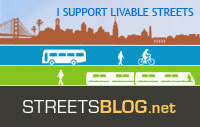Then President Elect Obama's train ride from Philadelphia to Washington D.C. for the inauguration was meant to be a symbolic gesture to his political hero Abraham Lincoln, I am hoping it is also symbolic of things to come in America. A re-birth for passenger rail. A counter revolution to the explosion of automobile ownership and use, that helped nearly push American railroads over the edge after World War II. Many railroads were pushed past the point of no return and fell into bankruptcy, and those that remained abandoned moving people and re-trenched in moving things.
The unenviable task of moving the few people left that still utilized movement by rail fell to Amtrak. They inherited broken equipment, and poorly maintained infrastructure. So far (since 1971) they have managed to survive, but never thrive. Basically, Amtrak was the son from a previous marriage to the Federal Government, while the airlines and interstates were the favorite kids. The government didn't want anything to do with Amtrak, but couldn't just abandon it, so they put as little effort (money) into Amtrak as possible. There are lots of debates as to why this is, but that is another blog for another time.
President Obama has pledged to change that, and has paid alot of lip service to what will happen with Amtrak. Now is a great time to increase our rail movement options. Gas is slowly but steadily climbing higher (again), and airline options out of Pittsburgh seem to be dwindling every day, and are not an inexpensive option.
Included in his remarks are talk about a high speed inter-city rail network, similar to Amtrak's already operating Northeast Corridor. Post Gazette has jumped on the bandwagon, and has reminded us all NOT TO FORGET PITTSBURGH!
I agree, don't forget Pittsburgh, but let's take a step back first. Before we try and get schnazzy electric powered trains running between Pittsburgh and points east and west, let's get some decent service that won't require billions more in stimulus money to come our way.
Here's a really easy solution: better choices i.e. more trains. As it stands right now, if you are conducting business in Harrisburg or Philly, you would have to leave a day early ( @ 7:20 AM from Pittsburgh) if you wanted to be in either place at the beginning of the business day the following day. Otherwise, if you leave the day of your business, you would not arrive in Harrisburg until 12:45 PM, or Philly until 2:50 PM.
If you arrived in Harrisburg @ 12:45 PM, you would have approximately 2 hours to conduct your business before you would have to catch a train at 2:26 PM back to Pittsburgh. If you are in Philly, forget it, you are stuck until the next day at noon.
If you want to go to Chicago, drink your coffee! You have to catch a train at midnight. This train at least would get you into Chicago at a manageable time (8:40 AM). On the way back, your train would leave Chi-town at 7:05 PM and get you into Pittsburgh bright and early at 5:30 AM.
Here's an idea, add a couple trains, one that leaves around 7 AM, but skips all the stops in the middle except Harrisburg and Philly. Then add one more from Philly that leaves at, say 5 PM and gets into Pittsburgh around 10 or 11. That way, business people can at least get their business in, and have the trip be somewhat practical. Additionally, add a couple of trains to and from Chicago as well. Instead of having a through train that stops in Pittsburgh, have a train that starts in Pittsburgh and travels to Chicago. Schedule it leave in the morning, from both locations. That would put the trains in their respective destinations around mid afternoon. Again, the point is to give people options. If you don't give people viable options, they won't choose to use different forms of transportation aside from their own cars.
These ideas are by no means an in-depth plan, just some ideas that came off the top of my head. One thing I do know is that the market is there. The new luxury bus service between Pittsburgh and Harrisburg is doing well (well enough to add additional service after only a few months of operation). I certainly support this service, but wouldn't mind seeing the Federal Government begin to properly subsidize additional forms of transportation other than highways.
Pittsburgh Street Lights Update
13 years ago
